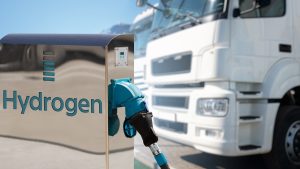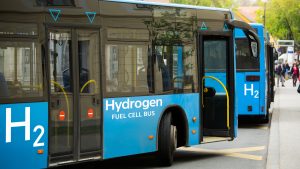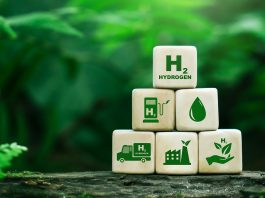As we stand on the precipice of a new era in sustainable transportation, the role of hydrogen fuel cells cannot be understated.
Hydrogen fuel cell technology presents an innovative solution to the challenges faced by our increasingly mobile society. It promises to transform our cities, industries, and even our homes.
Innovation News Network examines the recent advancements in hydrogen fuel cells and explores their implications for the future of transport.
Technological progress in hydrogen production
Significant advancements have been made in hydrogen production technologies in the realm of sustainable energy, heralding a new era of clean and efficient fuel sources. These developments are shaping the future of energy production, marking a critical transition from fossil fuels to more sustainable alternatives.
Among the advancements in hydrogen production technologies, a key innovation has been electrolysis.
Electrolysis utilises electricity to split water into hydrogen and oxygen, providing a clean and renewable method of producing hydrogen. Efficiency improvements in this process are becoming increasingly vital, as they have the potential to significantly reduce the energy consumption and environmental impact of hydrogen production.
Another significant breakthrough is the emergence of biological hydrogen production, which involves using algae or bacteria to produce hydrogen. This technology presents an environmentally friendly alternative to fossil fuel-based production methods, with the benefit of utilising waste products as feedstock.
Moreover, advancements in hydrogen storage and transportation technologies are crucial for implementing hydrogen as a sustainable fuel source. Innovative solutions such as metal hydrides and carbon nanotubes are being explored for their potential to store and transport hydrogen safely and efficiently.
Lastly, the advancement in hydrogen fuel cell technology, which converts hydrogen into electricity, is a game changer in transportation. With increased efficiency and reduced emissions, hydrogen fuel cells are projected to play a vital role in decarbonising the transport sector, providing a sustainable solution to our energy needs.
Hydrogen storage and transport innovations
Addressing the challenge of hydrogen storage and transport is a crucial step towards the widespread adoption of hydrogen as a sustainable fuel source.
In recent years, efforts have focused on storage optimisation, with technologies evolving to increase the density and decrease the cost of hydrogen storage. These include high-pressure tanks, metal hydrides, and even novel nanotech materials that can store hydrogen at a molecular level.
Transport efficiency is another key area of development. With the help of infrastructure innovation, companies are working on creating more robust, efficient, and affordable pipelines for hydrogen transport.
Moreover, the use of hydrogen-powered vehicles for transport is an emerging trend that not only reduces carbon emissions but also promotes the use of hydrogen fuel cells.
Safety measures are paramount in hydrogen storage and transport. New technologies are being developed to ensure the safe handling and delivery of hydrogen. These include improved storage containers, advanced leak detection systems, and safety protocols for handling and transporting hydrogen.
Regulatory compliance is also a significant aspect of this process. With the growing interest in hydrogen as a fuel, governments worldwide are updating and establishing regulations to ensure safety, encourage innovation, and promote the use of hydrogen.
Hydrogen refuelling challenges and solutions
Despite hydrogen’s promising potential as a sustainable fuel, numerous challenges persist in hydrogen refuelling, necessitating the exploration of innovative solutions.
One such issue is temperature management during the refuelling process. The high pressures involved in hydrogen refuelling create a tremendous amount of heat, which can lead to safety hazards and mechanical failures. Control strategies, such as advanced cooling systems and pressure regulation mechanisms, are being developed to manage these temperatures.
Refuelling protocols also present challenges, as differing standards across regions can lead to inefficiencies and compatibility issues. A global, standardised approach to hydrogen refuelling would streamline processes and make hydrogen vehicles more accessible.

Research into this area is ongoing, focusing on safety, reliability, and refuelling speed.
Emissions analysis is another crucial aspect of the hydrogen refuelling process. While hydrogen fuel produces zero tailpipe emissions, the production and refuelling processes can still lead to greenhouse gas emissions, depending on the source of the hydrogen and the energy used in the process.
New technologies and strategies are being explored to minimise these emissions and make hydrogen refuelling genuinely sustainable.
Mobile hydrogen refuelling developments
Building on the challenges and solutions in the hydrogen refuelling process, the concept of mobile hydrogen refuelling presents a significant development in this domain. It aims to overcome infrastructural limitations and increase accessibility.
This revolutionary approach offers portable solutions, enhancing refuelling efficiency and enabling ‘on the go’ refuelling for hydrogen-powered vehicles.
The introduction of mobile refuelling stations provides an innovative response to the lack of permanent hydrogen refuelling infrastructure, particularly in remote or rural areas. These temporary stations are designed for rapid deployment and easy dismantling, making them a practical solution for immediate refuelling needs.
They can be strategically located where demand is highest, providing a flexible and adaptable refuelling system.
The use of mobile refuelling units also significantly reduces the initial investment required to establish a hydrogen refuelling infrastructure, making it a financially viable option for regions in the early stages of transitioning to hydrogen-powered transportation.
Efficiency is another key advantage of mobile hydrogen refuelling. The process is quicker and more streamlined, minimising vehicle downtime. This is particularly beneficial for commercial vehicles, where any delay can have significant financial implications.
Hydrogen’s role in carbon-free transport
Undeniably, hydrogen is a pivotal player in the move towards carbon-free transport. It offers immense potential for reducing greenhouse gas emissions in the transportation sector.
As we strive for environmental benefits and energy efficiency, hydrogen provides a path to sustainable solutions that can seamlessly integrate into our current vehicle systems.
Hydrogen fuel cells, with their carbon-free applications, can be a key part of our transition to a sustainable transportation future. These cells convert hydrogen and oxygen into electricity, with water as the only by-product.
This makes them a highly attractive option for vehicle integration, as they have the potential to drastically reduce our reliance on fossil fuels.
Hydrogen’s role in carbon-free transport is not without challenges. The infrastructure for hydrogen refuelling stations is still in its early stages, and public awareness and acceptance of hydrogen vehicles need to be improved.
However, with suitable investment and policy support, hydrogen has the potential to revolutionise the transport sector. It provides a sustainable solution that benefits not only the environment but also the economy.
Infrastructure needs for hydrogen vehicles
Infrastructure challenges must be addressed with sustainable solutions to foster the development of a carbon-free transportation landscape.
Fuelling stations are a critical component of this infrastructure. However, hydrogen fuelling stations are considerably sparse, presenting a significant hurdle to the broader acceptance and use of hydrogen vehicles.
There is a clear need to scale up the deployment of these stations, particularly in urban areas where the demand for hydrogen vehicles is likely to be highest. However, urban hydrogen fuelling station deployment comes with its own set of challenges, including space constraints and safety considerations.

Grid integration is another vital aspect of the infrastructure needed for hydrogen vehicles. Power grids will need to accommodate the increased load from hydrogen production facilities. Advanced grid management strategies may be needed to ensure the stability of power networks and minimise disruptions.
Moreover, the entire hydrogen supply chain needs to be developed, from production to delivery. This includes constructing pipelines and storage facilities and the development of technologies for efficient and safe hydrogen transport.
Future directions in hydrogen fuel cell technology
As we navigate the complexities of our current energy landscape, the potential future of hydrogen technology is taking shape, with promising advancements and innovations on the horizon.
These advancements are driven not only by research opportunities but also by market trends and policy implications. The emergence of hydrogen as a key player in sustainable transportation is increasingly gaining momentum, opening up numerous investment prospects.
Despite the promising future, technological barriers must be addressed to harness the potential of hydrogen technology fully. These include challenges related to the production, storage, and transportation of hydrogen, which currently pose significant hurdles in the widespread adoption of this technology.
Furthermore, policy implications should be considered as they can help shape the direction of hydrogen technology. Policymakers have a crucial role in setting the right regulatory frameworks to foster hydrogen technology development and deployment.
As we move forward, it is crucial to continue exploring these aspects in depth while embracing the opportunities and addressing the barriers that arise.
This will be key to unlocking the full potential of hydrogen technology in sustainable transportation.










